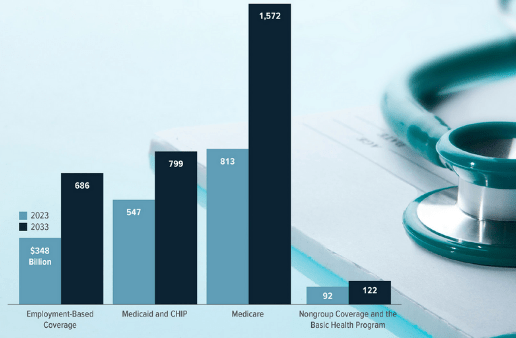In the landscape of health insurance in the United States, UnitedHealthcare stands out as a leading provider, serving millions of individuals, families, and employers across the country. As part of UnitedHealth Group, the largest healthcare company in the world by revenue, UnitedHealthcare offers a broad range of health insurance plans designed to meet the diverse needs of its customers. This article provides a comprehensive overview of the UnitedHealthcare Insurance Program, covering its history, types of plans offered, benefits, network coverage, customer service, and impact on the healthcare industry.
History and Background of UnitedHealthcare
UnitedHealthcare was founded in 1977 as part of Charter Med Incorporated, a company established by a group of healthcare professionals who aimed to introduce a new approach to health coverage. The company grew rapidly, and by the 1980s, it was renamed United HealthCare Corporation. Over the years, UnitedHealthcare has expanded its reach and diversified its services, becoming a dominant player in the health insurance market.
Today, UnitedHealthcare operates as a subsidiary of UnitedHealth Group, which was formed in 1998 as a parent company to manage the various business segments, including health insurance, healthcare services, and technology. UnitedHealth Group is consistently ranked among the top companies in the Fortune 500 list, highlighting its significant role in the healthcare industry.
Types of Health Insurance Plans Offered by UnitedHealthcare
UnitedHealthcare offers a variety of health insurance plans tailored to the needs of individuals, families, employers, and Medicare beneficiaries. These plans provide a wide range of coverage options, allowing customers to choose the plan that best suits their healthcare needs and budget.

- Individual and Family PlansUnitedHealthcare offers several individual and family health insurance plans, providing coverage for medical expenses, preventive care, and wellness programs. These plans are available through the Health Insurance Marketplace and directly from UnitedHealthcare. Key features of individual and family plans include:
- Health Maintenance Organization (HMO) Plans: HMO plans provide coverage through a network of healthcare providers. Members are required to select a primary care physician (PCP) and obtain referrals for specialist care. HMO plans typically have lower premiums and out-of-pocket costs, making them an affordable option for individuals and families.
- Preferred Provider Organization (PPO) Plans: PPO plans offer more flexibility in choosing healthcare providers, allowing members to see any doctor or specialist without a referral. While PPO plans have higher premiums than HMO plans, they provide greater freedom and access to a wider network of providers.
- Exclusive Provider Organization (EPO) Plans: EPO plans combine elements of HMO and PPO plans. Members must use the network of healthcare providers for coverage but do not need referrals to see specialists. EPO plans offer a balance between cost savings and flexibility.
- Catastrophic Health Plans: These plans are designed for individuals under 30 or those who qualify for a hardship exemption. Catastrophic plans have low premiums and high deductibles, covering essential health benefits and providing protection against worst-case scenarios.
- Employer-Sponsored PlansUnitedHealthcare is a leading provider of employer-sponsored health insurance, offering a range of group health plans for businesses of all sizes. Employer-sponsored plans are customizable, allowing companies to choose the level of coverage and benefits that best meet the needs of their employees. Common types of employer-sponsored plans include:
- Fully Insured Plans: In fully insured plans, the employer pays a fixed premium to UnitedHealthcare, which assumes the financial risk of covering employees’ medical expenses. These plans are straightforward and provide predictable costs for employers.
- Self-Insured Plans: In self-insured plans, the employer assumes the financial risk of covering employees’ medical expenses, with UnitedHealthcare providing administrative services and access to its network of providers. Self-insured plans offer greater flexibility and potential cost savings for larger employers.
- Health Savings Account (HSA) Qualified Plans: These plans are paired with high-deductible health plans (HDHPs) and allow employees to contribute pre-tax dollars to an HSA, which can be used to pay for qualified medical expenses. HSA-qualified plans promote consumer-driven healthcare and encourage employees to take an active role in managing their healthcare costs.
- Wellness Programs and Incentives: UnitedHealthcare offers a variety of wellness programs and incentives to promote employee health and well-being. These programs include health assessments, biometric screenings, smoking cessation programs, and fitness challenges.
- Medicare PlansUnitedHealthcare is a major provider of Medicare plans, offering a wide range of options to meet the needs of Medicare beneficiaries. UnitedHealthcare’s Medicare plans include:
- Medicare Advantage Plans (Part C): These plans provide all the benefits of Original Medicare (Parts A and B) and often include additional benefits such as prescription drug coverage, dental, vision, and hearing care. Medicare Advantage plans are offered through a network of healthcare providers, with different options for HMO, PPO, and Special Needs Plans (SNPs).
- Medicare Supplement Insurance (Medigap): Medigap plans are designed to help cover the out-of-pocket costs that Original Medicare does not cover, such as copayments, coinsurance, and deductibles. UnitedHealthcare offers a variety of Medigap plans, allowing beneficiaries to choose the level of coverage that suits their needs.
- Medicare Prescription Drug Plans (Part D): These plans provide coverage for prescription medications, helping Medicare beneficiaries manage the cost of their medications. UnitedHealthcare offers several Part D plans with different levels of coverage and formulary options.
- Medicaid PlansUnitedHealthcare offers Medicaid plans in several states, providing health coverage to low-income individuals and families, including children, pregnant women, and people with disabilities. UnitedHealthcare’s Medicaid plans are designed to meet the specific requirements of each state’s Medicaid program, offering comprehensive coverage for medical care, preventive services, and behavioral health.
- Short-Term Health InsuranceFor individuals who need temporary health coverage, UnitedHealthcare offers short-term health insurance plans. These plans provide coverage for a limited period, typically up to 12 months, and are designed to fill gaps in coverage, such as during a job transition or waiting for other insurance to begin. Short-term health insurance plans offer basic coverage for unexpected medical expenses but do not include all the benefits of comprehensive health insurance.

Benefits of Choosing UnitedHealthcare
UnitedHealthcare offers several benefits that make it a popular choice for health insurance coverage. These benefits include:
- Comprehensive Network of ProvidersUnitedHealthcare has one of the largest networks of healthcare providers in the United States, including doctors, hospitals, and specialists. This extensive network ensures that members have access to quality care, whether they need primary care services, specialist consultations, or hospital care. The wide network also provides members with options for choosing providers that meet their specific needs and preferences.
- Focus on Preventive CareUnitedHealthcare places a strong emphasis on preventive care, offering a range of services and programs designed to help members maintain their health and prevent chronic conditions. Preventive care services include annual wellness visits, immunizations, screenings, and health assessments. By focusing on preventive care, UnitedHealthcare helps members stay healthy and avoid costly medical interventions.
- Innovative Technology and Digital ToolsUnitedHealthcare leverages technology to enhance the member experience and improve healthcare outcomes. The company offers a variety of digital tools and resources, including:
- myuhc.com: This online portal allows members to manage their health benefits, find network providers, view claims and benefits information, and access health and wellness resources.
- UnitedHealthcare App: The mobile app provides convenient access to health plan information, digital ID cards, and the ability to track and manage health care expenses.
- Virtual Visits: UnitedHealthcare offers telehealth services, allowing members to consult with healthcare providers remotely for non-emergency medical issues. Virtual visits provide a convenient and cost-effective way to receive care.
- Wellness and Health Management ProgramsUnitedHealthcare offers a range of wellness and health management programs to help members achieve their health goals and manage chronic conditions. These programs include:
- Rally: Rally is a digital wellness platform that provides personalized health recommendations, challenges, and rewards to encourage healthy behaviors. Members can earn incentives for completing activities such as walking, exercising, and tracking healthy habits.
- Real Appeal: Real Appeal is a weight management program that offers personalized coaching, group support, and online tools to help members achieve and maintain a healthy weight.
- Disease Management Programs: UnitedHealthcare provides disease management programs for members with chronic conditions such as diabetes, asthma, and heart disease. These programs offer education, support, and resources to help members manage their conditions and improve their health.
- Customer Service and SupportUnitedHealthcare is committed to providing excellent customer service, offering multiple channels for members to get assistance with their health insurance needs. Members can contact customer service representatives by phone, email, or through the online portal. UnitedHealthcare also offers a 24/7 nurse hotline, providing members with access to medical advice and support at any time.
- Cost Management and AffordabilityUnitedHealthcare offers a variety of plans with different cost-sharing options, allowing members to choose a plan that fits their budget. The company provides tools and resources to help members understand their health care costs, compare prices for medical services, and find cost-effective providers. By offering cost management tools, UnitedHealthcare helps members make informed decisions about their health care and manage their expenses.
Impact of UnitedHealthcare on the Healthcare Industry
As one of the largest health insurance providers in the United States, UnitedHealthcare has a significant impact on the healthcare industry. The company’s influence extends to healthcare providers, policymakers, and the overall healthcare market.
- Driving Innovation in Healthcare DeliveryUnitedHealthcare is a leader in promoting value-based care, an approach that focuses on improving healthcare quality and outcomes while reducing costs. The company collaborates with healthcare providers to implement value-based payment models, which incentivize providers to deliver high-quality care and manage the health of their patients effectively. By promoting value-based care, UnitedHealthcare is helping to transform the healthcare delivery system and improve patient outcomes.
- Advancing Healthcare TechnologyUnitedHealthcare invests in healthcare technology and data analytics to enhance the delivery of care and improve member experiences. The company uses data to identify trends, predict health risks, and develop targeted interventions. UnitedHealthcare’s use of technology enables more personalized care, better management of chronic conditions, and improved coordination of care among providers.
- Influencing Healthcare PolicyUnitedHealthcare plays a role in shaping healthcare policy at the national and state levels. The company engages with policymakers, industry stakeholders, and advocacy groups to advocate for policies that improve access to care, promote affordability, and enhance the quality of healthcare. UnitedHealthcare’s involvement in policy discussions helps to ensure that the interests of its members and the broader healthcare community are represented.
- Expanding Access to CareUnitedHealthcare’s extensive network of providers and diverse plan options make it easier for individuals and families to access the care they need. The company’s commitment to serving Medicare and Medicaid populations also helps to expand access to healthcare for vulnerable and underserved communities. By providing a range of health insurance options, UnitedHealthcare contributes to improving access to care and addressing disparities in healthcare.
Conclusion
The UnitedHealthcare Insurance Program offers a comprehensive range of health insurance plans designed to meet the needs of individuals, families, employers, and Medicare beneficiaries. With a strong emphasis on preventive care, innovative technology, wellness programs, and customer service, UnitedHealthcare provides valuable health coverage and support to millions of members. As a leader in the health insurance industry, UnitedHealthcare plays a vital role in shaping the future of healthcare, promoting value-based care, advancing healthcare technology, and expanding access to quality care. Through its commitment to improving health outcomes and reducing costs, UnitedHealthcare continues to make a positive impact on the lives of its members and the healthcare system as a whole.











sz014a
e53zmj
7sczoi